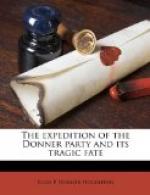That done, the squaws built a roaring fire, and one of them untied a bundle of hardwood sticks which she had brought for the purpose, and stuck them around under the fuel in touch with the hottest parts of the burning mass. When the ends glowed like long-lasting coals, the waiting crowd snatched them from their bed and rushed into the low thicket which grew in the marsh. I followed with my fire-brand, but, not knowing what to do with it, simply watched the Indians stick theirs into the bushes, sometimes high up, sometimes low down. I saw them dodge about, and heard their shouts of warning and their peals of laughter. Then myriads of hornets came buzzing and swarming about. This frightened me so that I ran back to where the brown babies were cooing in safety.
Empty-handed, but happy, they at length returned, and though I could not understand anything they were saying, their looks and actions betokened what a good time they had had.
Years later, I described the scene to Elitha, who assured me that I had been highly favored by those Indians for they had permitted me to witness their annual “Grub Feast.” The Piutes always use burning fagots to drive hornets and other stinging insects from their nests, and they also use heat in opening the comb cells so that they can easily remove the larvae, which they eat without further preparation.
With the first cold snaps of winter, my feet felt the effect of former frost bites, and I was obliged to spend most of my time within doors. Fortunately Baby Packwood had grown to be quite a frolicsome child. She was fond of me, and her bones had hardened so that there was no longer danger of my breaking them when I lifted her or held her on my lap. Her mother had also discovered that I was anxious to be helpful, pleased when given something to do, and proud when my work was praised.
I was quite satisfied with my surroundings, when, unexpectedly, Mr. McCoon brought my sister back, and once more we had happy times together.
CHAPTER XX
I RETURN TO GRANDMA—WAR RUMORS AT THE FORT—LINGERING HOPE THAT MY MOTHER MIGHT BE LIVING—AN INDIAN CONVOY—THE BRUNNERS AND THEIR HOME.
The Spring of 1848 was at hand when my brother-in-law said to me, “Grandma Brunner wants you to come back to her; and if, you would like to go, I’ll take you to the Fort, as soon as the weather changes, and leave you with the people who are getting ready to move north and are willing to take you with them to Sonoma, where grandma now lives.”
The storm was not over, but the day was promising, when my bundle of clothes was again on the pommel of the saddle, and I ready to begin my journey. I was so excited that I could hardly get around to say good-bye to those who had gathered to see me off. We returned by the same route that we had followed out on that warm June day, but everything seemed different. The catkins on the willows were forming and the plain was green with young grass.




